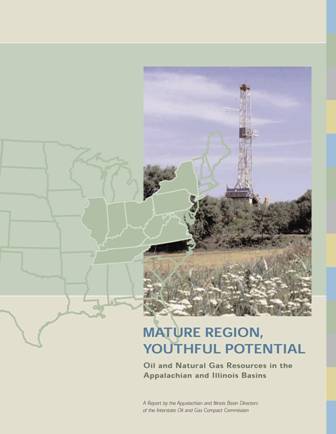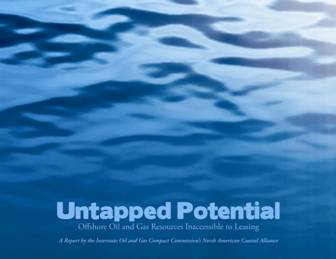IOGCC has been a partner with DOE on a great many projects. These two entities share many common goals. Two principal IOGCC foci are conservation and environmental protection—goals shared by DOE.
In the United States, each State develops a regulatory program for the exploration and production of oil and natural gas. IOGCC serves as a vehicle for improving all aspects of State programs. Significant challenges that government faces involve receiving input from the States and working collaboratively with multiple States on an issue or program. IOGCC serves as the States’ collective voice as well as the conduit through which information can flow from the DOE programs to the States.
Results
Major achievements under this multi-project grant have been the development of a model process for helping States develop benchmarks for the performance of State oil and gas regulatory programs, the creation of a publication highlighting underexplored potential reserves in the Appalachian and Illinois basins, production of a publication that provides an unbiased analysis of offshore oil and natural gas potential offshore in North America, the establishment of a forum for information-sharing among State oil and gas attorneys, and establishment of a forum for limiting duplication of regulations between States and the U.S. Environmental Protection Agency (EPA).
Benefits
Taken as a whole, the projects under this award serve State governments by streamlining regulatory processes, creating the ability to share best practices; identify performance measures that verify compliance with State exploration, production and environmental regulations; provide information on new technology to increase regulatory compliance, environmental protection and efficiency; and conduct regional or national projects that States acting alone cannot achieve. Also, significant training opportunities are offered to State employees.
Industry is served by more effective and efficient regulatory processes and by providing a forum for discussing issues of common concern.
The general public is served by the excellent environmental protection programs operated by the States, while industry is able to provide critical energy resources for the country. The public benefits daily from the production of domestic natural gas and crude oil.
Summary
This project has produced a number of successful efforts in four main areas.
Area of Interest No. 1—Regulatory Streamlining and Improvement. This area of interest continues to support IOGCC’s regulatory streamlining efforts that include the identification and elimination of unnecessary duplication of efforts among State and Federal programs dealing with exploration and production on public and private lands. Successful efforts include the following:
- Performance measures and goal training assistance have been provided to three States under this grant with two States having received the assistance during the past 8 months. The IOGCC has received very favorable feedback from the States receiving this assistance.
- The IOGCC also published “Investments in Energy Security: State Incentives.” It provides information on what incentives various member States are providing to spur the development of new oil and natural gas resources for both conventional and unconventional exploration techniques.
- IOGCC published its annual “Summary of State Statutes” for all member States. IOGCC will be working to identify other member States that would like this assistance during 2006-2007.
- The, IOGCC gathered information on a number of issues of importance to the States, such as production accountability, gathering line regulations, funding and fee structures, and field inspector status. Responses from individual States have been compiled and distributed to the States to provide the opportunity to evaluate efforts in other States. A forum for further collaboration was created by a meeting of the Council of State Regulatory Officials in May 2007.
- IOGCC revived its State Geologist forum at its 2006 Mid-Year Summit held May 21-23 in Billings, MT. This group had been inactive for about 5 years. The forum was revived to provide interstate and intrastate governmental discussions on oil and natural gas conventional and unconventional resource potential. The forum for State Geologists convened again at the IOGCC Annual Meeting in October 2006. Among other emerging topics, the group explored the geologic storage of carbon dioxide.
- The IOGCC also published the update of a Model Statute on Oil and Gas Conservation, which was developed originally many years earlier and is frequently updated.
- Under this funding source, the IOGCC has continued meetings of the IOGCC/EPA MOU Task Force, which is an effort to minimize duplication between state regulatory agencies and the U.S. Environmental Protection Agency. The latest meeting was held in May and explored topics that included air quality issues, storm water runoff, and spill prevention.
Area of Interest No. 2—Technology. This area of interest seeks to improve efficiency in States through the identification of technologies that can reduce costs and increase efficiency. IOGCC has been working with States to identify recent and cutting-edge technology that will enhance oil and gas regulatory compliance within member States.
- A small working group of State information technology professionals will meet in August to share experiences in providing appropriate data to the oil and natural gas industry and the public. The meeting will be held in Casper, Wyo., and hosted by the Wyoming Oil Conservation Commission. The purpose of this meeting will be to learn from State experiences in providing information that is helpful to those seeking to develop oil and natural gas prospects. This meeting will focus on lessons learned and the processing of identifying and acquiring information to encourage additional exploration and production.
- A similar working group has previously explored the fundamentals of creating a business case for technology upgrades, the addition of employees and software.
Area of Interest No. 3—Training and Education. This area of interest is vital for upgrading the skills of regulators and industry alike. Successful efforts include the following:
- Within the National Energy Policy, there are many appropriate training and education opportunities. Acting through the governors’ offices, States are very effective conduits for the dissemination of energy education information. While IOGCC favors the development of a comprehensive, long-term energy education plan, States are also supportive of immediate action on important concerns, such as environmental protection and conservation.
- Training and education opportunities provided to the States include naturally cccurring radioactive material (NORM) classes, waste minimization classes, and Oil and Gas Field Inspector exams. A survey of the States was performed in January 2006 to identify training needs of the States. IOGCC plans to offer training linked to the State responses over the next year.
- IOGCC offered training on NORM in Austin, TX, in June. The training consisted of a full day for 28 employees of the Railroad Commission of Texas (RRC). The RRC employees present included those from environmental services, site remediation, and field operations. The training proved so successful an additional four training sessions were scheduled for Texas in February.
- IOGCC provides oil and natural gas Inspector Certification testing for member States. IOGCC also developed an offshore module for the test in 2006. In June 2006, eight field inspectors from Oklahoma passed the exam. In September 2006, 30 inspectors from California took the exam, with 29 passing. IOGCC will be working with the States of Texas and California to certify inspectors in 2007.
Area of Interest No. 4—Resource Assessment and Development. This area of interest relates directly to helping maximize production of domestic oil and natural gas resources, including areas that are underexplored or have not been adequately defined. Successful efforts under this project include the following:
- In January 2006, the IOGCC workgroup known as the North American Coastal Alliance completed its in-depth offshore potential resources research and published a report titled Untapped Potential—Offshore Oil and Gas Resources Inaccessible to Leasing. This publication provides an unbiased report analyzing offshore oil and natural gas potential for North America. This report has been widely quoted as a source for the potential production from areas currently off-limits to exploration and production. IOGCC continues to aggressively promote a proactive plan to create awareness of and distribute this publication.
- In September 2005, the IOGCC workgroup known as the Appalachian and Illinois Basin Directors completed its in-depth study and research of oil and gas future potential in nine member States located within the Appalachian and Illinois basins. This report was titled Mature Region, Youthful Potential—Oil and Natural Gas Resources in the Appalachian and Illinois Basins. This report was revised and reprinted in March 2006 due to high demand for the publication. This report is credited with helping heighten exploration and production activities in underexplored areas of these basins.
- The IOGCC is updating its report on stripper, or marginal wells, at the present time. Statistics have been compiled from states with stripper gas and/or oil production. An economic analysis of the national impact of production from marginal wells is underway. This project should be completed and distributed during the next quarter.





